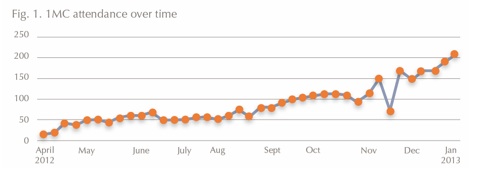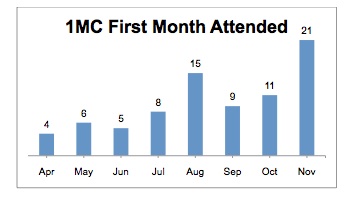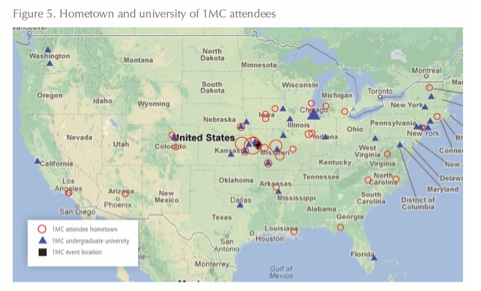When I was an undergraduate student, I employed a study and test-taking strategy that I suspect many advisors or professors would abhor. For the first exam in any given course, I would study the bare minimum I thought necessary to score an A. Depending on the course, this could have been a few hours, or sometimes not at all. My reasoning was that if I could do well with minimal effort, I would avoid wasting time over-studying for the rest of the semester. This turned out to be a successful strategy for me. If I did well on that first test, I had some confidence I would do well for the rest of the semester by repeating the initial effort. If I did so-so, I knew I needed to study marginally more for the rest of the semester.
From the perspective of a startup, I think what I was doing is similar to establishing a minimum viable product (or perhaps more apropos, "minimal viable effort"). Like my college strategy, I am interested in entrepreneurship education programs that, like many startups, are established at minimum viability - low-cost, easy-to-test solutions to try to help entrepreneurs and startups. If it works, keep at it; if it doesn't, oh well, try something different.
One such program that fits this description is Kauffman Labs' 1 Million Cups (1MC). 1MC is a weekly one-hour program where two startups give brief presentations about their companies (no more than six minutes in length) to an open-invitation audience typically comprised of entrepreneurs, people aspiring to be entrepreneurs, mentors, advisors and other supporters of entrepreneurship. Presentations are followed by 20 minutes of questions and discussion. Entrepreneurs most often discuss their startup story (what inspired the entrepreneur to start the company), where the company started to where they are currently, where the company hopes to go in the coming year and what they need to succeed.
The name 1 Million Cups draws on stereotypes of entrepreneurs and their love of coffee. The concept is that if entrepreneurs would drink one million cups together, a regular discourse among startups would occur, leading to a stronger learning experience and entrepreneurial network.
One of the big draws of 1MC, and the reason for my minimum effort introduction, is that it costs little to operate. If facility space is donated (which it is in this case), the primary remaining costs are for coffee and the in-kind time contribution of the organizer(s).
In a paper I co-authored with my Kauffman colleague, Yasuyuki Motoyama, we analyze a survey we conducted of 1MC attendees last November, just eight months after the program started, to gain a better understanding of the emergence of the network of 1MC attendees. The 79 responses represent an impressive 50 percent response rate. With this sample, we were able to put together some broad descriptive statistics and maps. In this post, I will focus on the attendance and geographic patterns, and implications for cities building entrepreneurship communities.
Attendance: fueled by word of mouth

The program launched in April 2012 with about a dozen people and attracted modest attendance the first couple of months. But by the end summer, attendance reached the 100-level and has since doubled to 200. As of February, the 260 mark has been breached.
We found that 42 percent of respondents attended nearly every week, and that many had been attending for quite some time. That is, 1MC has a very strong retention rate, and it holds over time -- nearly half of respondents first attended 1MC three months or earlier prior to the survey administration.

We asked respondents how they learned about 1MC, and the vast majority (67 percent) said they heard about the program via word of mouth. We asked these people to name the specific individual who referred them. Overall, we saw a wide variety of names mentioned.
- Named once: 24
- Named twice: 4
- Named three times: 2
- Group/organization was named: 2
We interpret these findings to mean that in the early stages of building an entrepreneurial network, word of mouth plays a dominant role and is a very diffuse effort. Most people did not come to 1MC because of its website, tweets, news stories or Facebook page. They decided to participate based on hearing about it from other people. And it was not just one person driving people to the event. Although the event's primary organizer is mentioned seven times, that is a small fraction of the sample; we see a wide spread of people referring others to the program.
This has important implications for other programs and cities that are currently starting or interested in starting programs to support entrepreneurs. In the age of digital media, in our experience, the human component still matters the most.
It will be interesting to see how 1MC continues to evolve this year. We do not know if word-of-mouth references will continue to play such a dominant role as the program matures. We live in a world cluttered with information; entrepreneurs may hear about an overwhelming assortment of programs and opportunities, and they may miss many more that are lost in all the commotion. In the case of early-stage education networks like 1MC, it will be interesting to see whether people will continue to serve as filters or if the 1MC brand itself will rise above the noise by virtue of standalone reputation.
Geography lessons for other cities

Kansas City is not typically viewed in the same vein as cities that the popular press frequently points to as startup hotbeds, e.g., Silicon Valley and Boston. While our sample size is relatively small (79 respondents), we are still able to paint some broad strokes about geography and mobility. Fifty-three percent of respondents call the KC metro area their hometown. In the figure above, we show the hometown location of 1MC attendees and, if they obtained an undergraduate degree, the location of their alma maters. The size of the circles and triangles are scaled to the number of people from that area.
We see many 1MC attendees draw from the Kansas City and surrounding Kansas and Missouri regions. However, representation extends to scattered cities across the United States. That is to say, there is a fair amount of 1MC attendees who have migrated to Kansas City, and many of them have founded or co-founded a business. There also is a fair amount of retention of Kansas City natives. We are not sampling people who left Kansas City, so we're unable to talk about outbound migration patterns. Still, the findings echo our previous research that shows that entrepreneurial activity takes place outside of the areas that receive a disproportionate amount of attention from the popular press. We feel that 1MC demonstrates that Kansas City and other similar cities and regions throughout the U.S. should not be forgotten when discussing entrepreneurial activity.
It seems the 1MC model is viable. We look forward to continuing to study this program, how it matures in Kansas City, and how it is adopted in other cities. Des Moines, St. Louis and Houston have been operating 1MC programs for a couple of months, and Reno and Cedar Rapids, Iowa, just launched. If your city is interested in 1MC as a model, check out 1millioncups.com.